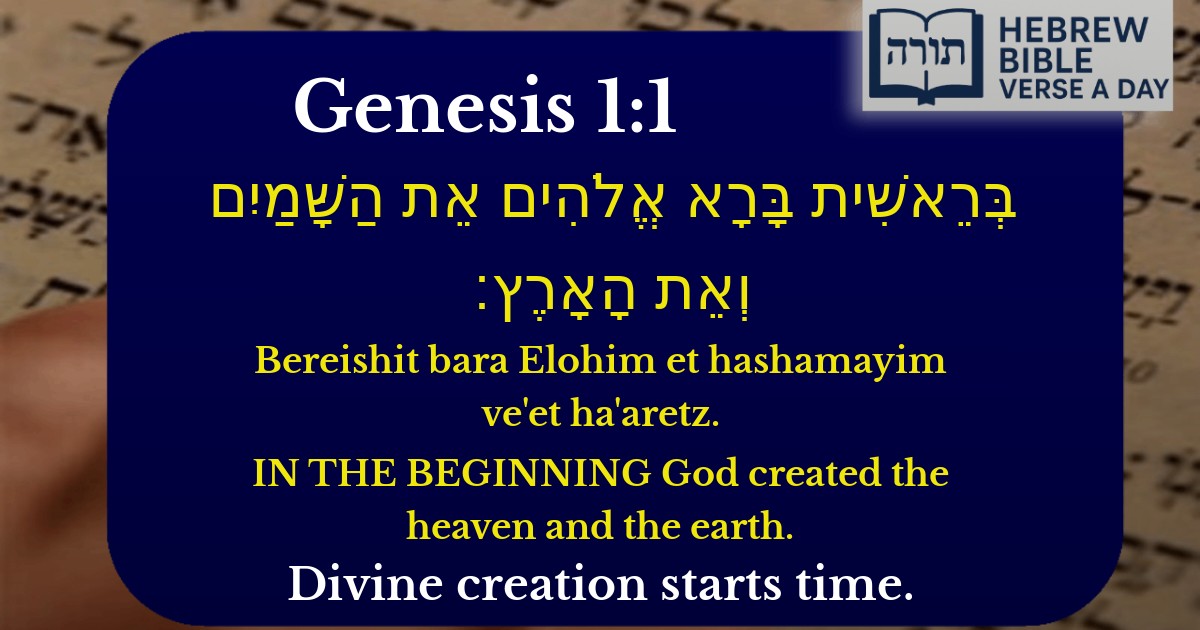Join Our Newsletter To Be Informed When New Videos Are Posted
Join the thousands of fellow Studends who rely on our videos to learn how to read the bible in Hebrew for free!
Hebrew Text
בְּרֵאשִׁית בָּרָא אֱלֹהִים אֵת הַשָּׁמַיִם וְאֵת הָאָרֶץ׃
English Translation
IN THE BEGINNING God created the heaven and the earth.
Transliteration
Bereishit bara Elohim et hashamayim ve'et ha'aretz.
Hebrew Leining Text
<big>בְּ</big>רֵאשִׁ֖ית בָּרָ֣א אֱלֹהִ֑ים אֵ֥ת הַשָּׁמַ֖יִם וְאֵ֥ת הָאָֽרֶץ׃
בְּרֵאשִׁ֖ית בָּרָ֣א אֱלֹהִ֑ים אֵ֥ת הַשָּׁמַ֖יִם וְאֵ֥ת הָאָֽרֶץ׃
🎵 Listen to leining
Parasha Commentary
📚 Talmud Citations
This verse is quoted in the Talmud.
📖 Chagigah 12a
The verse is discussed in the context of the creation of the world and the order of creation.
📖 Megillah 9a
The verse is referenced in a discussion about the Greek translation of the Torah and its accuracy.
📖 Sanhedrin 38b
The verse is cited in a discussion about the nature of God's creation and the uniqueness of humanity.
📖 Berakhot 13a
The verse is mentioned in a discussion about the importance of the first words of the Torah and their significance.


The Opening of Creation
The verse "בְּרֵאשִׁית בָּרָא אֱלֹהִים אֵת הַשָּׁמַיִם וְאֵת הָאָרֶץ" ("In the beginning, God created the heaven and the earth") serves as the foundational statement of the Torah, establishing Hashem as the sole Creator of all existence. Rashi (Genesis 1:1) explains that the Torah begins with creation to affirm Hashem's sovereignty over the world, particularly in response to those who might deny His authority. The term "בְּרֵאשִׁית" ("In the beginning") does not imply that time existed beforehand, but rather that time itself was brought into being with creation.
The Meaning of "בָּרָא" (Created)
The verb "בָּרָא" (created) denotes ex nihilo (creation from nothing), as emphasized by Rambam (Maimonides) in Moreh Nevuchim (2:13). Unlike human acts of making or forming, which repurpose existing materials, Hashem's act of בְּרִיאָה (creation) signifies bringing something into existence without any prior substance. The Ramban (Nachmanides) further elaborates that this initial creation included the raw, unformed matter ("תֹהוּ וָבֹהוּ") from which the universe was later shaped.
Heaven and Earth: Dual Realms
The pairing of "הַשָּׁמַיִם וְאֵת הָאָרֶץ" ("the heaven and the earth") represents the totality of creation. The Midrash (Bereishit Rabbah 1:14) teaches that "heaven" refers to the spiritual realm, including the angels and divine throne, while "earth" signifies the physical world. The Vilna Gaon notes that this duality underscores the harmony between the spiritual and material, both of which are sustained by Hashem's will.
Grammatical Nuances
Purpose of the Narrative
As the Sforno explains, the Torah begins with creation to establish humanity's responsibility toward the world. Since Hashem created and owns everything, human beings are stewards obligated to uphold justice and morality. This aligns with the Mishnah (Avot 3:14), which states that the world was created for Torah and righteous deeds.